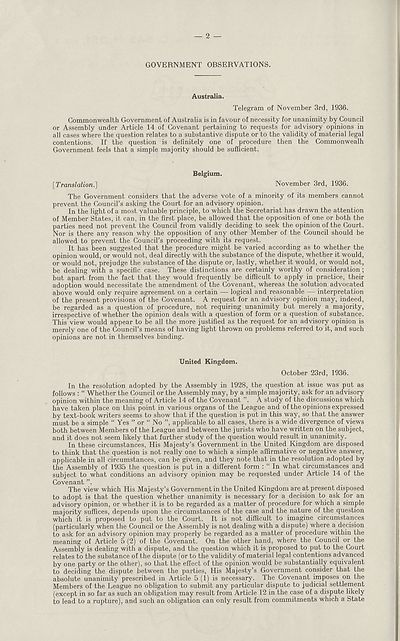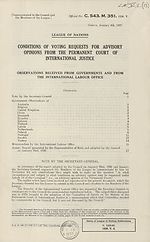Legal > Conditions of voting requests for advisory opinions from the Permanent Court of International Justice
(2)
Download files
Complete book:
Individual page:
Thumbnail gallery: Grid view | List view

— 2
GOVERNMENT OBSERVATIONS.
Australia.
Telegram of November 3rd, 1936.
Commonwealth Government of Australia is in favour of necessity for unanimity by Council
or Assembly under Article 14 of Covenant pertaining to requests for advisory opinions in
all cases where the question relates to a substantive dispute or to the validity of material legal
contentions. If the question is definitely one of procedure then the Commonwealh
Government feels that a simple majority should be sufficient.
Belgium.
[Translation.] November 3rd, 1936.
The Government considers that the adverse vote of a minority of its members cannot
prevent the Council’s asking the Court for an advisory opinion.
In the light of a most valuable principle, to which the Secretariat has drawn the attention
of Member States, it can, in the first place, be allowed that the opposition of one or both the
parties need not prevent the Council from validly deciding to seek the opinion of the Court.
Nor is there any reason why the opposition of any other Member of the Council should be
allowed to prevent the Council’s proceeding with its request.
It has been suggested that the procedure might be varied according as to whether the
opinion would, or would not, deal directly with the substance of the dispute, whether it would,
or would not, prejudge the substance of the dispute or, lastly, whether it would, or would not,
be dealing with a specific case. These distinctions are certainly worthy of consideration ;
but apart from the fact that they would frequently be difficult to apply in practice, their
adoption would necessitate the amendment of the Covenant, whereas the solution advocated
above would only require agreement on a certain — logical and reasonable — interpretation
of the present provisions of the Covenant. A request for an advisory opinion may, indeed,
be regarded as a question of procedure, not requiring unanimity but merely a majority,
irrespective of whether the opinion deals with a question of form or a question of substance.
This1 view would appear to be all the more justified as the request for an advisory opinion is
merely one of the Council’s means of having light thrown on problems referred to it, and such
opinions are not in themselves binding.
United Kingdom.
October 23rd, 1936.
In the resolution adopted by the Assembly in 1928, the question at issue was put as
follows : “ Whether the Council or the Assembly may, by a simple majority, ask for an advisory
opinion within the meaning of Article 14 of the Covenant ”. A study of the discussions which
have taken place on this point in various organs of the League and of the opinions expressed
by text-book writers seems to show that if the question is put in this way, so that the answer
must be a simple “ Yes ” or “ No ”, applicable to all cases, there is a wide divergence of views
both between Members of the League and between the jurists who have written on the subject,
and it does not seem likely that further study of the question would result in unanimity.
In these circumstances, His Majesty’s Government in the United Kingdom are disposed
to think that the question is not really one to which a simple affirmative or negative answer,
applicable in all circumstances, can be given, and they note that in the resolution adopted by
the Assembly of 1935 the question is put in a different form : “ In what circumstances and
subject to what conditions an advisory opinion may be requested under Article 14 of the
Covenant ”.
The view which His Majesty’s Government in the United Kingdom are at present disposed
to adopt is that the question whether unanimity is necessary for a decision to ask for an
advisory opinion, or whether it is to be regarded as a matter of procedure for which a simple
majority suffices, depends upon the circumstances of the case and the nature of the question
which it is proposed to put to the Court. It is not difficult to imagine circumstances
(particularly when the Council or the Assembly is not dealing with a dispute) where a decision
to ask for an advisory opinion may properly be regarded as a matter of procedure within the
meaning of Article 5 (2) of the Covenant. On the other hand, where the Council or the
Assembly is dealing with a dispute, and the question which it is proposed to put to the Court
relates to the substance of the dispute (or to the validity of material legal contentions advanced
by one party or the other), so that the effect of the opinion would be substantially equivalent
to deciding the dispute between the parties, His Majesty’s Government consider that the
absolute unanimity prescribed in Article 5 (1) is necessary. The Covenant imposes on the
Members of the League no obligation to submit any particular dispute to judicial settlement
(except in so far as such an obligation may result from Article 12 in the case of a dispute likely
to lead to a rupture), and such an obligation can only result from commitments which a State
GOVERNMENT OBSERVATIONS.
Australia.
Telegram of November 3rd, 1936.
Commonwealth Government of Australia is in favour of necessity for unanimity by Council
or Assembly under Article 14 of Covenant pertaining to requests for advisory opinions in
all cases where the question relates to a substantive dispute or to the validity of material legal
contentions. If the question is definitely one of procedure then the Commonwealh
Government feels that a simple majority should be sufficient.
Belgium.
[Translation.] November 3rd, 1936.
The Government considers that the adverse vote of a minority of its members cannot
prevent the Council’s asking the Court for an advisory opinion.
In the light of a most valuable principle, to which the Secretariat has drawn the attention
of Member States, it can, in the first place, be allowed that the opposition of one or both the
parties need not prevent the Council from validly deciding to seek the opinion of the Court.
Nor is there any reason why the opposition of any other Member of the Council should be
allowed to prevent the Council’s proceeding with its request.
It has been suggested that the procedure might be varied according as to whether the
opinion would, or would not, deal directly with the substance of the dispute, whether it would,
or would not, prejudge the substance of the dispute or, lastly, whether it would, or would not,
be dealing with a specific case. These distinctions are certainly worthy of consideration ;
but apart from the fact that they would frequently be difficult to apply in practice, their
adoption would necessitate the amendment of the Covenant, whereas the solution advocated
above would only require agreement on a certain — logical and reasonable — interpretation
of the present provisions of the Covenant. A request for an advisory opinion may, indeed,
be regarded as a question of procedure, not requiring unanimity but merely a majority,
irrespective of whether the opinion deals with a question of form or a question of substance.
This1 view would appear to be all the more justified as the request for an advisory opinion is
merely one of the Council’s means of having light thrown on problems referred to it, and such
opinions are not in themselves binding.
United Kingdom.
October 23rd, 1936.
In the resolution adopted by the Assembly in 1928, the question at issue was put as
follows : “ Whether the Council or the Assembly may, by a simple majority, ask for an advisory
opinion within the meaning of Article 14 of the Covenant ”. A study of the discussions which
have taken place on this point in various organs of the League and of the opinions expressed
by text-book writers seems to show that if the question is put in this way, so that the answer
must be a simple “ Yes ” or “ No ”, applicable to all cases, there is a wide divergence of views
both between Members of the League and between the jurists who have written on the subject,
and it does not seem likely that further study of the question would result in unanimity.
In these circumstances, His Majesty’s Government in the United Kingdom are disposed
to think that the question is not really one to which a simple affirmative or negative answer,
applicable in all circumstances, can be given, and they note that in the resolution adopted by
the Assembly of 1935 the question is put in a different form : “ In what circumstances and
subject to what conditions an advisory opinion may be requested under Article 14 of the
Covenant ”.
The view which His Majesty’s Government in the United Kingdom are at present disposed
to adopt is that the question whether unanimity is necessary for a decision to ask for an
advisory opinion, or whether it is to be regarded as a matter of procedure for which a simple
majority suffices, depends upon the circumstances of the case and the nature of the question
which it is proposed to put to the Court. It is not difficult to imagine circumstances
(particularly when the Council or the Assembly is not dealing with a dispute) where a decision
to ask for an advisory opinion may properly be regarded as a matter of procedure within the
meaning of Article 5 (2) of the Covenant. On the other hand, where the Council or the
Assembly is dealing with a dispute, and the question which it is proposed to put to the Court
relates to the substance of the dispute (or to the validity of material legal contentions advanced
by one party or the other), so that the effect of the opinion would be substantially equivalent
to deciding the dispute between the parties, His Majesty’s Government consider that the
absolute unanimity prescribed in Article 5 (1) is necessary. The Covenant imposes on the
Members of the League no obligation to submit any particular dispute to judicial settlement
(except in so far as such an obligation may result from Article 12 in the case of a dispute likely
to lead to a rupture), and such an obligation can only result from commitments which a State
Set display mode to:
![]() Universal Viewer |
Universal Viewer | ![]() Mirador |
Large image | Transcription
Mirador |
Large image | Transcription
Images and transcriptions on this page, including medium image downloads, may be used under the Creative Commons Attribution 4.0 International Licence unless otherwise stated. ![]()
| League of Nations > Legal > Conditions of voting requests for advisory opinions from the Permanent Court of International Justice > (2) |
|---|
| Permanent URL | https://digital.nls.uk/191517938 |
|---|
| Shelfmark | LN.V |
|---|
| Description | Over 1,200 documents from the non-political organs of the League of Nations that dealt with health, disarmament, economic and financial matters for the duration of the League (1919-1945). Also online are statistical bulletins, essential facts, and an overview of the League by the first Secretary General, Sir Eric Drummond. These items are part of the Official Publications collection at the National Library of Scotland. |
|---|---|
| Additional NLS resources: |
|

